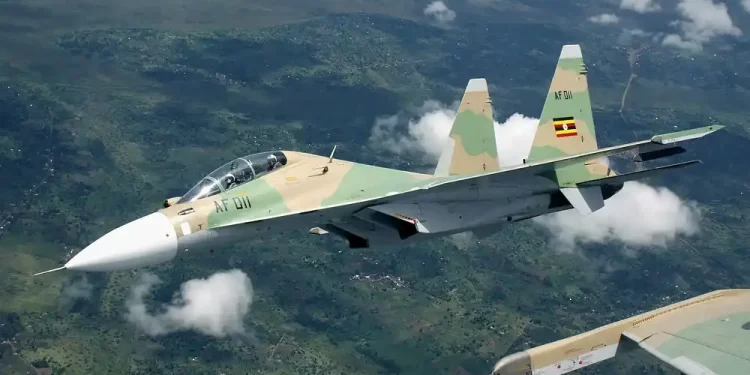By Mark Ocen
With Uganda’s struggle to attain a Middle income status, it is within this premise that an economy of this standing should make excellent priorities choices to achieve that development goal thus the policy analysts and the political wing of any country should be mindful of which policy priorities the country should adopt.
A developing country selecting to up the allocation by increasing it’s security spending by 30.4% from the local revenue collection in the subsequent financial years of 2021/22, 2022/23, 2023/24 is just unimaginable.
In 2021/22 security budget rose to 7.7 trillion, as human development capital budget stood at 6.8 trillion, Agro industrial capital was allocated 1.4 trillion and lastly regional development got 1.2 trillion of the budget allocations. In 2020 alone defense classified struck two trillion shillings.
When one tries to mirror into the priorities and budget allocations in this country, it gives a great picture of what matters, when and how, based on the policy priorities of this country. When a country looses focus on its human development capital or sectors, it’s a simplele implication that it has as well lost interest on its security as well, because; Moa Zedong in his China’s a hundred year marathon since 1949-2049 to gain global supremacy stated that China can’t afford to militarily to compete with America, however first focus on the economy then after tripling the size of it’s economy from the size of Americas economy by 2049 then invest in the militarily and defense sector to protect the wealthy and dynamic economy.
Military Investment Verses Economic Investment with a few global cases.
In the Make of the war in Ukraine, military budgets around the world have sky rocketed to bigger evaluations. This is most notable in Europe, where the threat of Russian aggression looms largest. Germany, Italy, Norway among others have already declined to spend more on defense. America and china, the world’s two biggest military spenders, are also ramping up their allocations. Pressure on small countries to do other wise seems inevitable.
What are the economic consequences of this push? When governments spend more on soldiers and arms, yet they have less available to be spent on other social based sectors which actually enhance social lives of citizens. A common assumption; therefore, is that extra spending on the armies and guns is so harmful to growth and development. But the relationship is not straightforward. In some ,cases bigger defense budgets may in fact yield substantial economic growth more especially in highly developed states or countries.
There are trade offs between spending on the army and on then to say; hospitals, roads and schools. This’ the lessons policy analysts should internalise early on. The classic model for illustrating the concepts of opportunity cost is the! “guns and butter”; the more you produce one, the less you can for the other. In any given years these simply holds true, governments have infinite budgets which can only be pulled in so many different directions. It’s thus easy to see how spending on defense taken to an extreme could be corrosive for an economy. If a government short changes the education system in order to buy shinny new weapons, the impact on productivity and ultimate growth would be shrunk.
Some economists think countries especially America which is a superpower is nearing that danger zone. The “Rand corporation”, an influential think tank supported by the air force, not exactly known as a peacenik outfit, published a report in 2021 laying out two risks; First, when the government allocates money to defense at the expense of key developmental yardsticks like, infrastructure, education, health, rural electrification, water and sanitation. This specifically may undermine the long-run growth prospects. Since countries have pressing need for better roads, schools, hospitals and many more others. Secondly defense spending contributes to the public debt load. In both cases, analysts concluded that anything that erodes a countries economic strength will ultimately hurt the armed forces.
Perhaps there’s something to the point that these trade off are damaging to the economy of America’s level. (Over the past decade it’s military budgets averages more than 4% of the GAP, second highest in OECD of wealth countries). But a complication emerges when examining trends overtime. The OECD members that spend the most on defense at about 6% of their GDP are; Israel which also consistently boosts one of the fastest growing economy in the group. By contrast, Japan is one of the lowest military spenders as a share of GDP in OECD and one of the slowest growers. In fact, it is almost impossible to discern pattern in the data; there are also countries such as Ireland, with military budgets similar to Japan and growth records similar to Israel. A basic regression reveals no consistent relationship between GDP growth and military spending for the 38 countries in the OECD.
A sprawling body of research has come to similar, albeit more nuanced conclusions. In a discussion paper at Monash university in 2014, Sefa Amamoryl Churchill and Siew Ling Yew examined 42 separate Studies, but they found two distinct categories: military expenditures in poorer countries is often detrimental to growth where as in wealth countries it’s more likely to be beneficial. One possible reason, they suggest is weaker governance in developing countries. A big military expenditure budget is a juicy target for the corrupt officials. Another possibility relates to the gun verses the butter frame work. The potential returns on civilian investment from health care to Education are so great in poorer countries that military spending has particular high opportunity costs. In rich countries with good schools and hospitals the opportunity costs ought to be lower.
One way in which defense spending may not be sound to boost the economy is as a jobs programs. If the forces were a cooperation, they would be America’s largest employer with two million workers ( counting active duty personal and civilians), beating Walmart and Amazon that said, would be an eye watering expensive jobs scheme, running at nearly $400,000 per employee per year. Defense spending may deliver better returns as an under declared form of industrial policy. In a paper last year Enrico Moretti of the University of California, Berkeley and two other colleague who worked at government funding for research and development (R&D), with focus on defense spending in OECD countries. On average, they found that a 10% increase in government financed R&D leads to a 5% increase in privately financed R&D, the targeted firms or industry more over there are knock on benefits for productivity. If France and Germany raised their defense spending to roughly the same level as in America. Mr. Moretti estimates that their growth productivity rates would be slightly higher as a result.
Dividends of Deterrence.
An obvious objection is that the government could achieve the same results by supporting (Research & Development) in general without pumping money into armed forces, in an economic sense these may be true. But there is apolitical constraint- namely, how to marshal support for experimentation that may fail. Public support for defense is less susceptible to mood swings. Without having to worry about it’s next grant application. The American military system has been free to churn out innovations from duct tape to the internet with out which modern life would be scarcely imaginable.
Important as it is to trace the impact of military spending on growth or innovations, such exercise risk missing the wider extent as demonstrated by Russian war in unknown. A foundational element for any successful economy is peace and stability giving firms the confidence to invest and people the space to flourish. Conclusively; “But in a world unsettled by revanchist powers the truth is that it is both guns and butter. A strong defense is regrettably, a necessity for a strong economy not otherwise”.
The author is a Senior NRM Carder with interest in global economy and international security; Contacts; 0782486523, email: om******@***il.com, tweeter; @mark11ocen, @ocenmark10.



